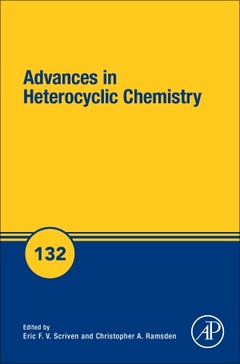Description
Advances in Heterocyclic Chemistry
Advances in Heterocyclic Chemistry Series
Directors of collection: Scriven Eric F.V., Ramsden Christopher A.
Language: English
Subject for Advances in Heterocyclic Chemistry:
492 p. · 15x22.8 cm · Hardback
Description
/li>Contents
/li>Readership
/li>Biography
/li>Comment
/li>
1. Synthesis and reactivity of fluorinated heterocycles Frederick A. Luzzio 2. The Friedländer reaction: A powerful strategy for the synthesis of heterocycles Nazanin Ghobadi, Niousha Nazari and Parisa Gholamzadeh 3. Eight-membered heterocycles with two heteroatoms in a 1,5-relationship of interest in medicinal chemistry Barbara Parrino, Stella Cascioferro, Daniela Carbone, Girolamo Cirrincione and Patrizia Diana 4. The chemistry of labeling heterocycles with carbon-11 or fluorine-18 for biomedical imaging Shuiyu Lu, Fabrice G. Siméon, Sanjay Telu, Lisheng Cai and Victor W. Pike 5. The literature of heterocyclic chemistry, part XVIII, 2018 Leonid I. Belen’kii, Galina A. Gazieva, Yulia B. Evdokimenkova and Natalya O. Soboleva
Graduate students and research workers in academic and industrial laboratories, organic chemists, polymer chemists and biological scientists
Chris Ramsden was born in Manchester, UK in 1946. He is a graduate of Sheffield University and received his PhD in 1970 for a thesis entitled ‘Meso-ionic Compounds’ (W. D. Ollis) and a DSc in 1990. Subsequently he was a Robert A. Welch Postdoctoral Fellow at the University of Texas (with M. J. S. Dewar)(1971-3), working on the development and application of semi-empirical MO methods, and an ICI Postdoctoral Fellow at the University of East Anglia (with A. R. Katritzky)(1973-6), working on the synthesis of novel heterocycles. In 1976 he moved to the pharmaceutical industry and was Head of Medicinal Chemistry (1986-1992) at Rhone-Poulenc, London. He moved to Keele University as Professor of Organic Chemistry in 1992, where he is now Emeritus Professor. His research interests include the structure and preparation of novel heterocycles, three-centre bonding in the context of the chemistry of betaines and hypervalent species, and the properties of the enzyme tyrosinase and related ortho-quinone chemistry. He was an Editor-in-Chief of ‘Comprehensive Heterocyclic Chemistry III’ and a co-author of ‘The Handbook of He
- Considered the definitive serial in the field of heterocyclic chemistry
- Serves as the go-to reference for organic chemists, polymer chemists and many biological scientists
- Provides the latest comprehensive reviews written by established authorities in the field
- Combines descriptive synthetic chemistry and mechanistic insight to enhance understanding of how chemistry drives the preparation and useful properties of heterocyclic compounds
These books may interest you

Advances in Heterocyclic Chemistry 236.94 €

Advances in Heterocyclic Chemistry 193.44 €


